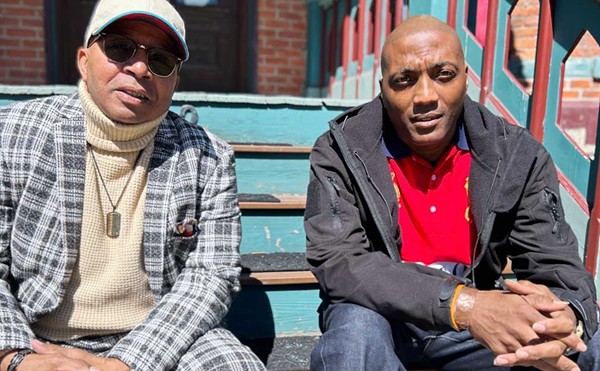Confessions of a Superhero
Arts Alliance America/Red Envelope Entertainment
If Jesus has blessed you with an address in or near Hollywood, U.S.A. (as he has with this lucky writer), the sight of people dressed as cartoonish film icons standing in front of the legendary Chinese theater (where the cement handprints are) hustling tourists for photos and "contributions" is only another fragment in the parade of ho-hum weirdness that makes up terra firma H-wood.
For the non-jaded, however, this Matthew Ogens-directed doc on the folks who suit up everyday as Batman, Superman, the Incredible Hulk and Wonder Woman offers an intriguing glimpse into their odd existences. Are they losers? Failed dreamers? Eccentric, panhandling mutants? Happy weirdos? All of the above?
The viewer is the judge. Ogens dosen't mock his subjects, but reveals — for better or worse — the backgrounds and motivations of these unknowns masquerading as indelible pop culture characters. We see a faux Superman in his cramped apartment that bulges with Superman memorabilia. We meet Batman, who dons his duds in a men's room, and Wonder Woman, a curvaceous gal from Tennessee who moved West fueled with dreams of stardom but now walks Hollywood Boulevard with stars sewn into the WW costume on her oft-ogled ass.
The pitch here is not a new one: Tinseltown is filled with also-rans begging to suck the glamorous, dollar-spewing teat of Mama Show Biz. When said teat proves elusive, the clothes of a superhero at least allow one to be a sidewalk someone. And make a buck. —Peter Gilstrap
Great World of Sound
Magnolia Home Entertainment
It's ironic that at a time when the record industry is recording record losses, along comes an indie movie about ordinary people with dreams of stardom getting scammed into paying for a record deal by a fly-by-night record label. What year is this? Pat Healy and Kene Holliday play the hustling talent scouts/salesmen hired to perpetrate the false hope and struggle with the ensuing guilt as they get increasingly more adept at their jobs. Midway through, the film switches gears from a music-biz Glengarry Glen Ross to American Idol, as real people are filmed auditioning for real actors. It sounds exploitative but ultimately isn't, director and co-writer Craig Zobel — who won a Gotham Breakthrough Award for his work here — only showcases the best entries, inserts a few bogus bad acts to keep things balanced (what? You don't think American Idol does this?) and everyone gets a moment to shine in the DVD extras. It's a testament to the finely honed performances of the two leads that you never notice the jump from documentary improv and scripted spiel, especially Holliday, who brings the same love for undercover work here he displayed as a Matlock regular, where his main responsibility was getting into fights every week. In a perfect world, everybody'd have BMG record deals, but I'd settle for a real-life all-girl band that dresses up like sexy stewardesses. Even stewardesses don't do that anymore. —Serene Dominic
42nd Street Forever Vol. 3: Exploitation Explosion
Synapse Films
Man, they sure don't make movie trailers like they used to. They don't. For proof, check out Synapse Film's newest collection of old-school trailers. These ain't your slick-as-shit, high-gloss ones similar to those you're bombarded with after plunking down a ten-spot at your local multiplex. No, Volume 3 of the 42nd Street Forever series focuses on the down-dirty exploitation flicks of the '70s and '80s. There are 45 of them grouped roughly by genre, in some cases subgenres. You get the exploitation mainstays, from martial arts and T&A to killer kids and doc-sploitation — tragic historic events given a lurid docu-drama revamping. One standout in this trailer-park menagerie is Phase IV, the only film directed by Saul Bass, who's best known for raising opening credit sequences to an art form while working on Hitchcock's many films, including Psycho. The trailer is part psychedelic freak-out, part sci-fi paranoia. The disc's audio commentary track features Fangoria managing editor Michael Gingold, film historian Chris Poggiali and Avmaniacs editor Edwin Samuelson offering a discourse about the actors, directors and even the various long-gone studios that made these lovely obscuros.
The only bummer is that after watching, say, the Exploitation Explosion trailer, you'll be hot to seek out the film to view in its entirety. Sadly, very few of the films are available on VHS and only a couple on DVD. Talk about your exploitation! —Paul Knoll
Gangsta Rap: A Glockumentary
ThinkFilm
Remember the movie CB4? Apparently the makers of Gangsta Rap don't. This low-budget mockumentary attempts to poke fun at both hip-hop stereotypes and the stylistic formulation of music documentaries and fails at both. (Don't they know that this was all done much better several times previously?) By gleefully invoking rancid stereotypes and played-out observations on the L.A. hip-hop scene, it is possible that Gangsta Rap is actually so postmodern that it's one big statement about how hip hop has become self-parody, so this parodic venture is, in and of itself, a self-parody ... but that's just too much meta to fit into one movie. It's more likely that the amateurish performances and subpar scripting are simple symptoms of amateurish, subpar filmmaking. Though the actors clearly think they're blessed with improvisational chops and excellent comedic timing, their stilted delivery is a constant distraction. Even worse, the time-sensitive references that should drive this nostalgic fakery don't hold up; when the group (called Gangsta Rap, of course) "debuts" in the '80s, they're totally rocking their mics over beats that didn't gain traction until nearly a decade later. Visionaries? Hardly. When a hip-hop comedy makes Don't Be a Menace to South Central While Drinking Your Juice in the Hood look like This Is ... Spinal Tap, then perhaps it's time to lay the idea of mock-mockumentaries to rest. —Jason Ferguson
Soul's Midnight
Image Entertainment
Vampires used to be such an uncomplicated proposition — a slow guy who doesn't get around much in the daytime, searches for neck gravy at night and counts crucifixes and garlic as major turnoffs. But now you got your low-grade vampires that go out in daylight, daylight savings vampires, vampires that zip around like Segways, vampires that eat human flesh and shape-shift, and now, in this movie, atheist vampires that can enter a church because they don't believe in You-Know-Who. So stop making that cross with your index fingers!
Luckily, vampire movies only divide into two categories "Vamp" and "Camp." If your car breaks down in Transylvania and you've gotta spend the night in a lonely count's castle, you're in vamp territory. Everything else is the latter, but this B-movie might qualify as "Vamp d'Camp" since it combines old-fashioned charm with present-day smarm. The plot is built around the legend of St. George and the dragon, an unsuspecting young couple (is there any other kind?), a creepy gothic hotel (where the crimson halls look like someone redecorated the Overlook from The Shining after the torrents of blood disgorged from the elevator) and a contemporary count of sorts who wants the couple's child as a human sacrifice that will resurrect their evil leader. Would that be ... uh ... a dragon? I'm not telling. Other camp touchstones: people screaming in unison like it's Scooby-Doo, a sequence where an undead old woman attacks two men at hyperspeed like a Benny Hill sketch and the scenery-snacking of the evil hotelier (an ingratiating Armand Assante, who purses his lip after each line like he's trying to kiss an old woman and avoid touching wrinkles). If you're the kind of vamp who likes to sprawl on the couch with the drapes drawn on a Saturday afternoon, lest you turn to a smoldering pile of ash, this is better-than-average lazy fun. —Serene Dominic





